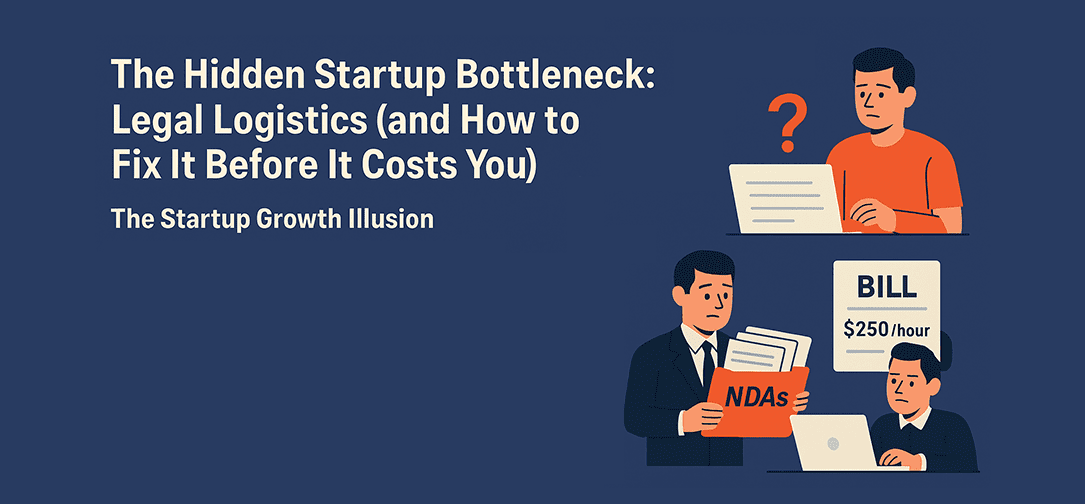The Startup Growth Illusion
Here is a common scenario for many startups across different industries.
Your product is scaling, and users are growing. Everything looks good until the small cracks start to appear. It could show up in a couple of different forms:
- A contractor wants payment, but the contract agreement was never defined.
- An investor asks for your NDAs and finds five versions in old emails.
- Your lawyer sends a bill for $250/hour to “clean things up.”
Behind the scenes, it’s not a product-market fit holding founders back. It’s legal logistics.
Why? The reason is simple! Most startups make the mistake of not systemizing their legal processes as they do finance or other business-related operations. In most cases, the legal logistics of the startup are treated like a secondary attachment.
Statistically speaking, 62% of small business owners admit to signing contracts without fully understanding them. Startup founders rarely invest time and resources into the legal logistics of their operations. This isn’t negligence, it’s bandwidth. Legal clarity isn’t systematized the way finance is, creating a hidden growth bottleneck. The fix isn’t more lawyers. It’s a better system.
The Real Cost of Legal Disorganization
Legal chaos may not seem dramatic, but it finds a way to show up in quiet, yet expensive ways. Sometimes, its effects are hidden behind non-legal operations. Here is a breakdown of some of the most common ways legal disorganization shows up, and how much damage it can cost a startup:
1) Deal Delays and Disruptions
This is one of the most common ways to identify legal disorganization in contract management. These contracts are either poorly prepared or poorly managed, which can delay deals and affect the proper flow of operational processes.
Many Investors attest to the fact that missing or poorly prepared investment documents and contracts can delay deal closings. It can also affect the validity of your offer. This oversight becomes a very costly distraction that can affect a startup’s already sensitive timeline.
2) Slow Onboarding
A key part of a startup’s operation is fuelled by hired talent. Every new contractor or hire would require certain legal documentation, which could also include an NDA, MSA, or payment terms.
With no standardized template or organized procedure to follow, issues with legal logistics start to show up. Such issues do not die down, but tend to exacerbate as operations expand. These legal issues would stall growth in the long run.
3) Re-work Fundraising.
Funding is a critical aspect for a startup’s success, and finding rounds requires the utmost organization. When documents live in scattered files with missing details and disorganized documents, round funding becomes difficult and frustrating.
Startup founders end up searching through hundreds of email attachments, digging for month-old contracts, or scrambling to find IP assignments. A clear and organized legal arm would save time. It also demonstrates professionalism to investors and partners, which is key for sustainability.
4) Mounting Costs
The major disadvantage of legal disorganization is that it gives room to inefficiencies, which might seem small and negligible at first. However, over time, they begin to add up to major setbacks that affect the bottom line.
At the end of the day, startups have to pay thousands to patch up mistakes that could have been prevented with proper legal organization. This happens not because they’re careless, but because they never built a repeatable legal workflow. This translates to mounting costs that could have been better invested in scaling up.
Rather than treat legal documentation as a housekeeping task, most startup founders obsess over financial dashboards and CRM automation. This leaves their legal foundation as a shared drive full of PDFs with legal implications.
When your agreements are clear, current, and accessible, investors, partners, and clients trust you more. A startup with clean, tidy, accessible agreements sends the signal of maturity.
Where Startups Go Off-Track
There are three major points where most startups start to veer off track. These points are like legal traps that startups fall into when legal disorganization is at play.
1) Template Confusion
Founders tend to copy contracts that are generic with no direct application to their business or operations. As a result, certain cracks show up in the form of inconsistent clauses, skipped sections, and misspecified details. Using a one-size-fits-all template for legal contracts with little to no customization can lead to very serious consequences.
2) Version Chaos
Version chaos happens when you have different versions of the same document and files in email threads and shared folders. After some time, the versions tend to get mixed up and important details mumbled together.
The key parties ask questions like, ‘Which NDA is the final one?’ with critical time wasted on hunting for a specific one. With proper contract management, you can solve this by organizing files, tracking all changes, and storing final signed copies.
3) Delayed Clarity
Delayed clarity happens when a startup team fails to answer basic contract questions. Instead of moving forward with a deal, this results in delayed negotiations. In fact, 63% of tech leaders say confusing contract language has already caused delays. If you have to call a lawyer to clarify every detail, it can turn into a reason investors cite when walking away.
For startups, delayed clarity is the most costly.
When founders can’t understand their own contracts, deals stall. Collaboration slows. And trust erodes. That’s where new AI tools are shifting the equation. They make legal clarity faster and inexpensive.
AI: The Quiet Revolution in Legal Logistics
AI tools come in as the game-changer, revolutionizing legal logistics for startups all over the globe. AI isn’t replacing lawyers; it’s bridging the understanding gap. They step in to simplify many processes in the legal pathway.
Modern platforms can now:
- Summarize agreements in plain English: AI tools can scan a 30-page contract and extract the essential details in a readable format. This way, startup Founders can instantly get a short overview of all core details in their legal documents without missing any line.
- Highlight key risks: Legal documents between multiple parties can sometimes be riddled with hidden clauses, terms, and conditions that can affect a startup through the back door. With AI tools, these key risks are flagged automatically at a single glance in a matter of minutes.
- Enable on-demand Q&A: Imagine having a contract analyst in your pocket. Many AI tools come with assistants that let you query your documents in a conversational manner. These tools can save up to 240 hours per year on routine contract review.
This isn’t theoretical; it’s the new layer of legal infrastructure helping startups stay organized without slowing down. Companies that leverage these tools gain instant clarity without adding headcount.
How to Build Scalable Legal Infrastructure
When it comes down to building a scalable legal infrastructure, it is best to think of it like a mini tech stack. This means reducing surprises, but not by adding extra layers of paperwork. The goals at the end should be quicker answers, reduced last-minute tasks, and clearer contracts. Here is a follow-through guide to get this done:
- Centralize everything: Ensure all important documentations such as MSAs, NDAs, vendor contracts, and equity docs are kept in a single, searchable, and accessible hub. You can adopt a contract management tool or a secure cloud drive to get this done.
- Standardize templates: Ditch the all-in-one templates and the ad-hoc Google Docs. Instead, opt for lawyer-vetted templates and documentations for your agreements. Ensure that they are custom-built to your business operations and offers.
- Automate clarity: Automate legal clarity as much as possible, either with AI tools or workflow software. This helps you save time and prevent the risk of important terms and clauses being swept under the rug. This helps you fix all legal problems before they become costly emergencies.
- Review regularly: Treat legal housekeeping like a monthly routine. It should be frequently visited, reviewed, and adjusted. Check your archives for expired NDAs, confirm IP assignments, and update your templates. This proactive action prevents last-minute issues.
Platforms like SMVRT Legal are making this accessible by helping startups generate lawyer-drafted templates, summarize complex terms, and organize everything in one place. It’s the legal system founders wish they had before things got messy.
Takeaway: Systemize Trust
The fastest-growing startups aren’t just product-driven; they’re system-driven. While detailed, well-organized legal logistics won’t make your pitch deck look flashier, it will certainly help your startup grow stronger.
Investors tend to back founders who are able to show a level of control, clarity, consistency, and sustainability. All of these rest on proper legal logistics, and it goes beyond just the paperwork, but into proper execution.
At the helm of it all, compliance is not just documentation; it is your secret weapon to building credibility, minimizing risk, and ensuring that you attract the right investors. Growth follows trust. Trust begins with understanding exactly what’s in your contracts.



































